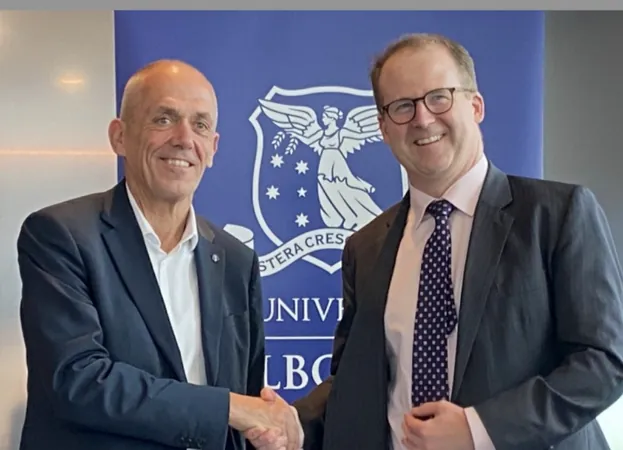
Breakthrough Partnership: Australia Unveils Revolutionary International Cancer Research Lab!
2024-11-08
Author: Sophie
Introduction
In a ground-breaking initiative, the University of Melbourne has partnered with France's renowned National Centre for Scientific Research (CNRS) to establish a cutting-edge International Research Laboratory in Melbourne, Australia.
This new facility is set to enhance and expand the existing collaboration between the high-caliber cancer research teams led by Professor Frédéric Hollande at the University of Melbourne and Dr. Patrick Mehlen from CNRS in Lyon.
Location and Purpose
The laboratory, strategically located at the Victorian Comprehensive Cancer Centre (VCCC), aims to accelerate vital research discoveries and facilitate innovative clinical trials internationally.
A significant formal agreement—a Letter of Intent—was signed at VCCC by Professor Mark Cassidy, the Deputy Vice-Chancellor (Research) at the University of Melbourne, and Professor Antoine Petit, the esteemed Chairman and CEO of CNRS, underscoring the commitment of both institutions to this ambitious project.
Funding and Name
This pioneering CNRS International Research Laboratory, jointly funded by CNRS and the University of Melbourne, solidifies a robust long-term partnership that builds on years of fruitful collaboration.
Named ‘PHANTOM’ (Plasticity, Heterogeneity, and Tumour Microenvironment), the laboratory will leverage state-of-the-art technological methods to investigate how cancer cells evolve over time within the body, aiming to unveil the triggers that foster cancer cell development and their ability to thrive amid changing environments.
Research Focus
Professor Hollande expressed optimism about the lab's potential, stating it will address critical genetic and non-genetic factors that contribute to the persistent adaptability of cancer cells.
Such adaptivity plays a significant role in treatment resistance, particularly in aggressive cancers with notoriously poor survival rates, like metastatic colorectal and pancreatic cancers.
Mission Statement
Echoing this sentiment, Dr. Mehlen highlighted the laboratory's mission to explore the development of innovative drugs capable of halting tumor adaptability and overcoming the limitations of existing cancer therapies.
Conclusion
With these efforts, the PHANTOM lab not only marks a significant leap in cancer research collaboration but also opens up new avenues for potentially life-saving treatments, offering hope to countless patients battling some of the most challenging forms of cancer.
Stay tuned for updates as this exciting partnership begins to unveil new possibilities in the fight against cancer!









 Brasil (PT)
Brasil (PT)
 Canada (EN)
Canada (EN)
 Chile (ES)
Chile (ES)
 España (ES)
España (ES)
 France (FR)
France (FR)
 Hong Kong (EN)
Hong Kong (EN)
 Italia (IT)
Italia (IT)
 日本 (JA)
日本 (JA)
 Magyarország (HU)
Magyarország (HU)
 Norge (NO)
Norge (NO)
 Polska (PL)
Polska (PL)
 Schweiz (DE)
Schweiz (DE)
 Singapore (EN)
Singapore (EN)
 Sverige (SV)
Sverige (SV)
 Suomi (FI)
Suomi (FI)
 Türkiye (TR)
Türkiye (TR)